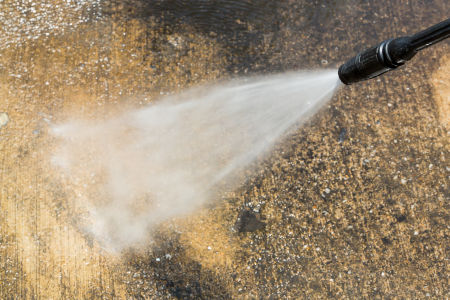How Dirty Sidewalks Become a Safety Hazard

When it rains, we all know to tread carefully, but what many homeowners and business owners don't realize is just how dangerous a dirty sidewalk can become, especially when wet. Moss, algae, mildew, and built-up grime can create a slick surface that poses serious slip-and-fall risks. These hazards aren't just inconvenient; they can lead to injury, liability issues, and costly repairs. In this article, we'll break down why keeping your sidewalks clean isn't just about aesthetics - it's a matter of safety.
The Build-Up of Slippery Substances
Over time, sidewalks accumulate more than just dirt. Organic growth like moss, mold, and algae, thrives in shaded, damp environments, making concrete walkways the perfect breeding ground. When left untreated, these substances create a slick, slimy layer that becomes especially dangerous when it rains. What may look like harmless discoloration is often a sign of a much more hazardous surface underneath.
Here are some of the most common slippery substances that build up on sidewalks:
- Moss - Feeds on moisture and shade, often growing in joints and cracks in the concrete. It becomes extremely slick when wet.
- Algae - Appears as green or black patches, typically in damp areas. It forms a thin, slimy film that can make sidewalks feel like an ice rink.
- Mildew - Grows in humid areas, adding to the slipperiness and often giving off an unpleasant odor.
- Dirt and Dust - Though not organic, compacted dirt mixed with moisture forms a muddy layer that reduces traction.
- Fallen Leaves and Pollen - Organic debris left to decay creates a nutrient-rich surface for slippery growth to spread faster.
When these elements combine, especially in high-traffic areas or shaded zones, the sidewalk becomes not only dirty but dangerously slick. The solution? Professional pressure washing cuts through layers of grime and organic matter, restoring the concrete's natural texture and grip. This helps prevent slips, prolongs the life of your sidewalks, and keeps your property looking clean and well-maintained.
Regular cleaning not only improves safety but also prevents these substances from embedding deeper into the surface, where they become harder to remove. Preventing build-up is far easier and cheaper than dealing with the consequences of a fall.
Increased Risk of Slip-and-Fall Accidents
Slip-and-fall accidents are one of the most common causes of injuries on both residential and commercial properties. Dirty, slippery sidewalks are often the culprit, especially in high-traffic areas. For businesses, this can lead to legal liability, insurance claims, and potential lawsuits. For homeowners, it can result in injuries to family members, guests, or even delivery workers. Regular sidewalk cleaning is a proactive step to protect everyone who walks on your property.
Why Rain Makes It Worse
When rain hits a clean sidewalk, it usually drains away without issue. But when water combines with layers of organic material and grime, it can create a slick surface akin to black ice. What looks like a harmless wet sidewalk can become a serious hazard. Pressure washing removes these hidden dangers and ensures your walkways maintain their grip, even in wet conditions.
Preventative Maintenance That Pays Off
Routine sidewalk cleaning may seem like a small chore, but it can prevent big problems. By scheduling regular pressure washing with University Park's trusted exterior cleaning provider, you avoid the long-term effects of erosion, concrete deterioration, and moss growth. This not only makes your property safer but also preserves your concrete, saving money on costly repairs or resurfacing in the future.
Clean sidewalks aren't just about making a good first impression. They're about keeping people safe. Especially during wet weather, dirty sidewalks become a real hazard that's easy to overlook until it's too late. With regular professional cleaning, you can eliminate slippery buildup, reduce liability risks, and extend the life of your concrete.